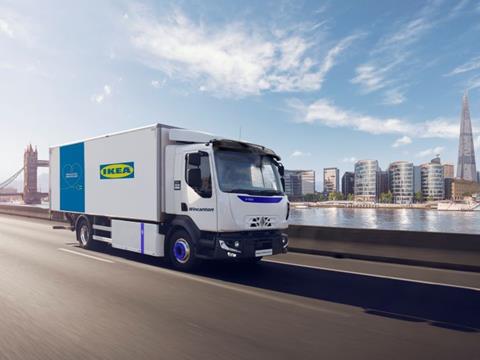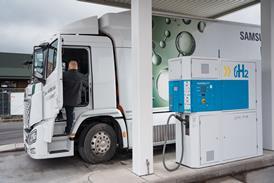Wincanton, one of the UK’s leading logistics providers, is accelerating its journey towards decarbonisation, reporting early successes in an electric vehicle (EV) trial with IKEA and preparing to roll out 24 electric heavy trucks by 2026. Speaking at the Logistics UK Decarbonisation Conference, Sean Clifton, Fleet Director at Wincanton, framed these efforts as part of the biggest transformation in the industry in a century.

Wincanton’s trial with IKEA has showcased the viability of light electric vehicles for commercial logistics, albeit with some challenges, Clifton shared with delegates. Over the last 18 months, the company has worked closely with the furniture retailer on a project involving operating 10 electric 16-tonne trucks and 20 electric vans on home deliervies to IKEA customers across Greater London and the Southeast.
Clifton hailed IKEA’s investment and ambition in decarbonisation, noting it has “made the process easier, though not easy.” The trial demonstrated that electrification can deliver results for shorter routes and rigid vehicle use cases. “It’s been a steep learning curve, but the partnership with IKEA proves what’s possible when there’s a shared commitment to sustainability,” said Clifton.
Rolling out heavy electric trucks
Participating in the Innovate UK ‘Zero Emissions HGV and Infrastructure Demonstration’ (ZEHID) funding programme, Wincanton hopes to be operating battery electric trucks over 40 tonnes no later than March 2026.
Clifton acknowledged that the goal is ”24 trucks” which represents just a fraction of Wincanton’s 9,000-strong fleet but he stressed the importance of taking those first steps.
“You’ve got to be brave, you’ve got to try hard to see the end goal,” Clifton told the conference audience. “This is all coming, and you’ve got to start somewhere.”
Also as part of the ZEHID programme, Wincanton is aiming to have its own charging infrastructure in place by early next year across a mix of eight Wincanton and customer sites, focusing initially on depot-based charging. Clifton emphasised that public charging infrastructure, while critical for the long term, remains costly and logistically challenging. “Depot charging is our priority. Destination charging will follow, and on-route charging will be the last piece of the puzzle for us,” he explained.
Collaboration key to scaling up
Collaboration, Clifton argued, will be essential to scale electrification and reduce costs. He pointed to the need for logistics operators, customers, and infrastructure providers to work together to share resources and data.
“Sharing infrastructure whenever possible will be really important,” said Clifton. “It’s not going to be easy, but as long as we’re commercially fair and eyes-wide-open about the risks, it can absolutely work.”
He also underscored the importance of supporting smaller operators and SMEs in the supply chain, noting Wincanton’s willingness to leverage its purchasing power to help partners access EV technology. “The rising tide lifts all boats,” he said. “We want SMEs supporting us to have access to our infrastructure. That helps everyone.”
A century-defining challenge
Reflecting on the scale of the transition ahead, Clifton described decarbonisation as “the most significant change in logistics since the introduction of diesel vehicles in the 1920s”. He urged the sector to prepare for operational changes and to make incremental improvements while awaiting broader infrastructure developments.
“Modelling your operations now and overlaying that with electric capabilities can reveal just how much is already achievable,” Clifton noted. “But let’s not kid ourselves—there are no easy wins here.”
With its IKEA trial providing a proof of concept and the deployment of 24 electric trucks signalling a bold next step, Wincanton is positioning itself as a leader in the logistics industry’s push towards net zero. “It’s not about waiting for the perfect moment,” Clifton concluded. “We know this is coming. The time to act is now.”


















